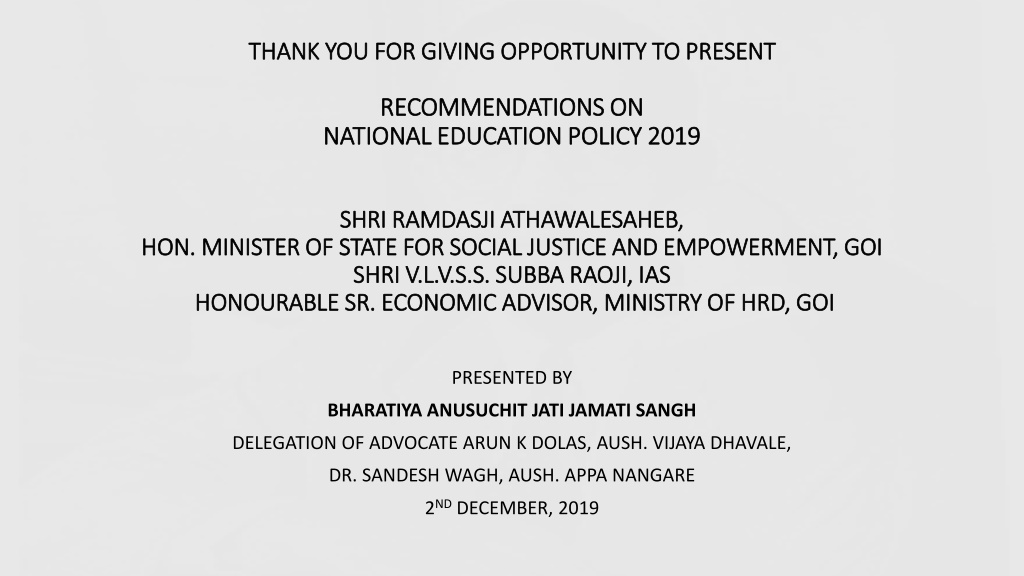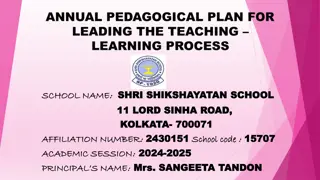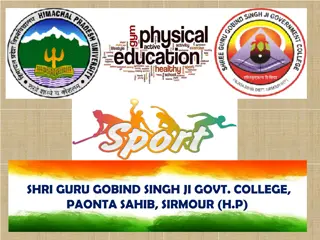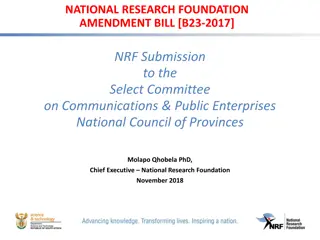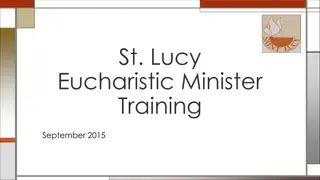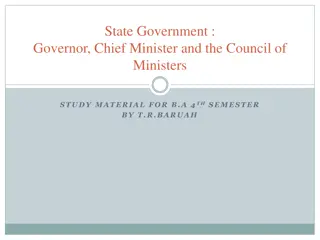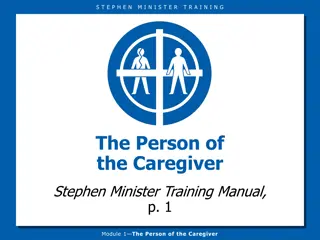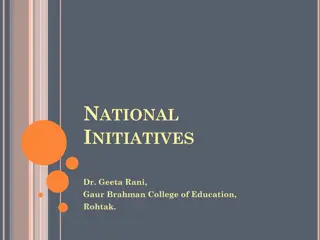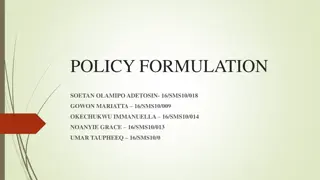Recommendations on National Education Policy 2019 Presented to Shri Ramdasji Athawale, Minister of State for Social Justice and Empowerment, GOI
Recommendations were presented to Shri Ramdasji Athawale and other honorable members on the National Education Policy 2019, focusing on equitable and inclusive education for all, especially SC/ST/OBC communities. The suggestions aim to provide equal opportunities in education and employment, ensuring participation and learning outcomes are equalized by 2030.
Download Presentation

Please find below an Image/Link to download the presentation.
The content on the website is provided AS IS for your information and personal use only. It may not be sold, licensed, or shared on other websites without obtaining consent from the author. Download presentation by click this link. If you encounter any issues during the download, it is possible that the publisher has removed the file from their server.
E N D
Presentation Transcript
THANK YOU FOR GIVING OPPORTUNITY TO PRESENT THANK YOU FOR GIVING OPPORTUNITY TO PRESENT RECOMMENDATIONS RECOMMENDATIONS ON NATIONAL EDUCATION POLICY 2019 NATIONAL EDUCATION POLICY 2019 ON SHRI RAMDASJI ATHAWALESAHEB, SHRI RAMDASJI ATHAWALESAHEB, HON. MINISTER OF STATE FOR SOCIAL JUSTICE AND EMPOWERMENT, GOI HON. MINISTER OF STATE FOR SOCIAL JUSTICE AND EMPOWERMENT, GOI SHRI V.L.V.S.S. SUBBA RAOJI, IAS SHRI V.L.V.S.S. SUBBA RAOJI, IAS HONOURABLE SR HONOURABLE SR. ECONOMIC ADVISOR, MINISTRY OF HRD, GOI . ECONOMIC ADVISOR, MINISTRY OF HRD, GOI PRESENTED BY BHARATIYA ANUSUCHIT JATI JAMATI SANGH DELEGATION OF ADVOCATE ARUN K DOLAS, AUSH. VIJAYA DHAVALE, DR. SANDESH WAGH, AUSH. APPA NANGARE 2NDDECEMBER, 2019
WE THANK WE THANK The learned members of the Committee for drafting New Education Policy 2019 (NEP), in consultation with different stakeholders, such as, UGC, AICTE, NCTE, NCERT, AIU, NIEPA, NAAC; educational institutions and organisations; eminent personalities; professional education groups, various Ministries of the Government of India, NITI Aayog, and international organisations like the United Nations Children s Fund (UNICEF). For recommending revolutionary measures to overhaul India s education systems such as, Nalanda Mission, Takshashila Mission, formation of Rashitrya Shiksha Aayog, National Research Foundation, scholarships for students of disadvantaged groups, four years of secondary school education with multidisciplinary studies, involving parents, students, social workers, counsels, tutors, Instructional Aids, etc. for reaching education to every household, research-oriented HEIs, no-profit approach for running educational institutions, adult education program, and so on, to shape an education system that benefits all of India s children so that no child loses any opportunity to learn and excel because of the circumstances of birth or background. 2
Our Recommendations Our Recommendations OBJECTIVES: TOREALIZE DREAM OF HON. PRIME MINISTER, SHRI NARENDRA MODI, SABKA SAATH SABKA VIKAAS EQUITABLE AND INCLUSIVE EDUCATION , THE OBJECTIVE STATED IN CHAPTER 6 OF NEP, so that all children have equal opportunity to learn and thrive, and so that participation and learning outcomes are equalized across all genders and social categories by 2030. Seeding education in the SCST families staying at remotest places; Motivating and facilitating them to take higher education Providing career in teaching and non-teaching fields at all levels in all educational Institutions and Regulatory Authorities, concerned with education PROCEES FOLLOWED FOR ARRIVING AT RECOMMENDATIONS THINK TANK OF 8 - ACADEMICIANS, ADVOCATE, SOCIAL WORKERS IDENTIFIED PARAS IN NEP WHICH NEEDED MODIFICATION TO ACCOMMODATE OUR AFORESAID OBJECTIVES SUGGESTED MODIFICATIONS IN THOSE PARAS FOR PROVIDING EQUITABLE OPPORTUNITIES TO SCSTOBC CITIZENS IN EDUCATION AND EMPLOYMENT 3
TOPICS OF OUR RECOMMENDATIONS TOPICS OF OUR RECOMMENDATIONS WE SUMMARIZED RECOMMENDATIONS UNDER FOLLOWING TOPICS: PREEMPTION OF DISCRIMINATION AND ATROCIOUS ADVANCES BUDGET ALLOCATION, SCHOLARSHIPS, ETC. ADEQUATE REPRESENTATION OF SCSTOBCs IN JOBS IN EDUCATIONAL INSTITUTIONS ADEQUATE REPRESENTATION OF SCSTOBCs IN AAYOGs, COUNCILS, COMMITTEES, ETC. ADEQUATE REPRESENTATION OF SCSTOBC STUDENTS, SCHOLARS, OTHER DESERVING BENEFICIARIES IN ADMISSIONS, AWARDS, PROGRAMS, ETC. LEGAL AND LOGICAL JUSTIFICATION FOR PROVIDING RESERVATION IN PRIVATE HEIs RECOMMENDATIONS FOR EFFECTIVE IMPLEMENTATION OF RESERVATION POLICY AND FOR PROVIDING ADEQUATE REPRESENTATION IMPORTANT RECOMMENDATIONS 4
PREEMPTION OF DISCRIMINATION AND ATROCIOUS ADVANCES PREEMPTION OF DISCRIMINATION AND ATROCIOUS ADVANCES Page No. 173, Para No.7.7.3: under the heading, Performance management of teachers : Following parameters in respect of SCST Students, be added in the basic code of conduct for teachers, with extra weightage, in their annual appraisals: Treatment meted out to SC ST Students on the basis of their feedback; Academic Performance of SC ST Students, Special Initiatives taken to improve academic performance of SC ST Students, No. of SC ST students passed in the concerned teacher s subject, No. of SC ST students outperformed in the concerned teacher s subject; No. of SC ST students selected as peer tutor, No. of SC ST students received merit scholarships, No. of SC ST students selected for National and International quizzes, No. of SC ST students dropped from the school education, No. of drop-out students received help for continuing school education, No. of special lectures or sessions conducted for SC ST students, No. of parents of SC ST students counseled, No. of seminars conducted for SC ST parents and students to address their issues, No. of SC ST students helped to pursue higher education abroad, and so on. 5
PREEMPTION PREEMPTION OF DISCRIMINATION OF DISCRIMINATION AND Page No. 208 and 209: Para No. P9.4. Under the heading, Curriculum, pedagogy, assessment, and student support will be revamped Strong e-vigilance and intelligence systems for students be put in place Involve representatives of disadvantaged groups in systems, The aims and approach is to effectively preempt discriminatory or atrocious advances by administration or faculties or non-SCST students of the institution, Objectives: To guard a student of disadvantaged groups from adverse effects of discriminatory or atrocious treatment, on his academic career. To enable him / her to undisturbedly concentrate on his studies and research instead of getting mentally harassed and wasting his / her time and energy in knocking the doors of support systems for getting justice against the wrongs perpetrated. AND ATROCIOUS ADVANCES ATROCIOUS ADVANCES Contd 6
PREEMPTION PREEMPTION OF DISCRIMINATION OF DISCRIMINATION AND Page No. 260: Para No. P13.1.6. Para under the heading, Permanent (tenure) employment track for university staff including faculty : The probation period for SCs and STs non-teaching staff should be two years by exempting them from 360 degree feedback. The probation period for SCs, and STs faculties should be two years subject to their respective subjects students passing ratio of 50% or such passing ratio in the same subject taught by other permanent faculties, whichever is lesser. Amend code of conduct for all at HEIs, to treat asking any employee about caste or religion; asking him incriminating questions to ascertain caste or religion; attempting to dig out such information from administrative office, sharing or discussing such information, as misconduct. AND ATROCIOUS ADVANCES ATROCIOUS ADVANCES Contd 7
PREEMPTION PREEMPTION OF DISCRIMINATION OF DISCRIMINATION AND AND ATROCIOUS ADVANCES ATROCIOUS ADVANCES Page No. 261: Para No. P13.1.8. Para under the heading, Orientation programme for new faculty : Each new SCST faculty member should be assigned a faculty mentor having a long tenure in the HEI and an exemplary track record. Strong vigilance and intelligence system led by head of a HEI - involve representatives of advantaged and disadvantaged groups preempt any initiative or conspiracy to harass new or any SC ST students, faculties or non- teaching staff, Treat harassment / atrocities on SC and ST students, faculties and non-teaching staff, as gross misconduct Provide for strictest punitive action of termination of enrolment or job, as the case may be, with adverse remarks on original credentials Debar from admission or job or other occupation opportunity, as the case may be, for at least three years. The recommendations of 3 members committee headed by Professor Dr. Sukhadeo Thorat should be implemented in the HEIs to curtain discrimination against SCs and STs. Contd 8
PREEMPTION PREEMPTION OF DISCRIMINATION OF DISCRIMINATION AND AND ATROCIOUS ADVANCES ATROCIOUS ADVANCES Page Nos. 262 & 263: Para No. P13.1.10. Para under the heading, Career and compensation management of faculty and other employees of HEIs The goals and objectives set up for individuals should include parameters such as: No. of SC ST students passed and outperformed; No. of SC ST students who successfully got PHD degrees, No. of SC ST students represented HEIs in national and international conferences, No. of SC ST students sent abroad in the schemes of international exchange of scholars, No. of SC ST students dropped from the higher education curriculum and No. of such students who received help for continuing higher education, No. of special lectures or sessions conducted for SC ST students, No. of parents of SC ST students counseled, No. of seminars conducted for SC ST parents and students to address their issues, No. of SC ST students helped to pursue education abroad, and so on. Promotions of SC ST persons are delayed due to number of writ petitions filed in Courts on trivial grounds. The Court decisions add more grounds for further litigations, thus delaying and destroying career progress of SC ST members for generations, in spite of provision of reservation in promotions in the Constitution of India. The supervisors, peers, juniors, and even students brought up in such caste-biased Indian society cannot be expected to give fair inputs about SC and ST faculties, during 360 degree feedback exercise. Therefore, the MHRD should devise a separate career progression, promotion and compensation determination policy for SC ST faculties, to be followed by all HEIs. This policy should include aspects as given in the paragraph below. Accreditation should be given and continued subject to compliance of this policy. This policy should provide reservation in promotions to SC ST faculties provided in the Constitution. The SC ST faculties should be considered eligible for promotions if their subjects students passing ratio is 60% consistently for two years or such passing ratio in the same subject taught by other permanent peer faculties of the same HEI or if not available in the same HEI, then of the nearest HEI, whichever is smaller Give 10% weightage to 360 degree feedback from supervisors, peers and students, minimum 50% of which should be from SC and ST, taken together. The HEIs should reserve for SC ST faculties, at least 50% seats of all academic / administrative committees and other joint initiatives for student support and fill them after discussion and consensus with the SC ST faculties through formal meetings and by recording proceedings of such meetings. The compensation levels and its increases as well as future trajectory of compensation for SC ST employees shall in no way be detrimental or discriminatory, to their interest. 9
PLEASE CONSIDER FOLLOWING FACTS PLEASE CONSIDER FOLLOWING FACTS Source : CAG Report in Maharashtra: Indian Express dated 5.7.2019 31,613 SC and Nav Boudh (NB) students were denied rent, meals and travel allowances under Bharat Ratna Dr. Babasaheb Ambedkar Swadhar Scheme, between 2016 and 2018. The students had to forgo financial compensation of Rs. 60,000, Rs.51,000 and Rs. 43,000 annually depending on the category of metro cities. During 2016-17, against a target of 15,000 students, the Swadhar scheme benefited only 2,562 students. In 2017-18, against a target of 25,000 students, only 5,825 got benefits. Rs. 148 Crores released by the finance department to 7 regional departments, only Rs.29 Crores could be incurred on the Scheme. The balance Rs.119 Crores was surrendered. 57,537 applications from students in 2016-17 and 21,269 applications in 2017-18 were not considered for hostel admission. The Government hostels for backward class students was mandatory in every taluka as per a 2005-06 policy. However, even after 10 years, Government hostels in 128 talukas were not opened. 10
PLEASE CONSIDER FOLLOWING FACTS PLEASE CONSIDER FOLLOWING FACTS Source : Indian Express dated 7.7.2019 on Union Budget Budget estimate for post-matric scholarships for SC students has been slashed from Rs. 3,000 Crores to Rs. 2,926 Crores Budget estimate for post-matric scholarships for ST students has been slashed from Rs. 1,643 Crores to Rs. 1,613 Crores Fellowships and scholarships for PhD and post-doctoral courses have constantly declined since 2014-15 from Rs. 602 Crores to Rs. 283 Crores in 2019-20 for SC Students Fellowships and scholarships for PhD and post-doctoral courses have constantly declined since 2014-15 from Rs. 439 Crores to Rs. 135 Crores in 2019-20 for ST Students Allocation for higher education funds for SCs and STs has reduced by 23% in UGC and 50% in IGNOU. 11
BUDGET ALLOCATION, SCHOLARSHIPS, ETC. BUDGET ALLOCATION, SCHOLARSHIPS, ETC. Page No. 144: under the heading, Targeted funding and support for inclusion and access to districts and institutions: The Central, State Governments and District Administration should ensure that the budget allocated and amount spent for education of SCs, STs and OBCs should be at least in proportion to their population in the respective Districts. Scholarships given by the public and private educational institutions, Government supported accredited institutions and private institutions, all HEIs (private and public), should be sufficient to meet all requisite expenses of SCST students to enable him to concentrate on his studies. (Para Nos. P16.5.1., P16.9.4., P18.4.1., P17.1.20.c., P18.6.3.) Higher Education Grants Council (HEGC) and other such concerned bodies should ensure implementation of this provision. Contd .. 12
BUDGET ALLOCATION, SCHOLARSHIPS, ETC. BUDGET ALLOCATION, SCHOLARSHIPS, ETC. Page No. 241: under the heading, Ensuring that learning environments are engaging and supportive for all students to succeed : Institutions must support SCs, STs students with: Admission without payment of any fees, Adequate amount of scholarships with 50% of it disbursed in advance, Special allowance to buy a laptop Book-bank Extra lectures Hostel accommodation on priority, Personal loans at priority sector lending rate to maintain dependent family members till completion of education Page No. 381: Para No. P21.3.1. and P21.3.2. regarding Adult Education and one-on-one tutors: Pay fixed monthly honorarium to all Preraks, NATP tutors, and adult education instructors subject to continuation of their services on the basis of satisfactory performance in six monthly reviews. Give scholarships after the adults beneficiaries appear for exams with min 90% class attendance Incentive scheme should be devised for passing with distinction, in first attempt, etc. 13
ENSURE ADEQUATE REPRESENTATION OF SCSTOBCs ENSURE ADEQUATE REPRESENTATION OF SCSTOBCs IN IN JOBS IN EDUCATIONAL JOBS IN EDUCATIONAL INSTITUTIONS (The brackets followed after each suggestion has reference of para Nos. of Draft NEP2019) (The brackets followed after each suggestion has reference of para Nos. of Draft NEP2019) INSTITUTIONS IMPLEMENT RESERVATION POLICY IN RECRUITMENT &/OR PROMOTION OF: Instructional Aides, tutors, educated members of local community, social workers, counsellors, - by taking District as a unit. (P2.16) Promotions of teachers (P5.4.3.) Admissions in all B.Ed. programmes proposed to be devised on the basis of duration. (P5.5.1.) Teaching and non-teaching staff in all State and private schools, colleges, educational institutions (P6.3.1.) School teachers, at each stage, viz., Foundational, Later Primary, Upper Primary and Secondary (7.4.) SCMCs and SMCs Chairmanship be rotated amongst groups- SMCs to have SCSTOBC representative teachers of each stage (Foundational, Later Primary, Upper Primary and Secondary) (P7.5.3 & P7.5.4.) Staff of SSRA (State School Regulatory Authority) (P8.1.3. (b)) National Postdoctoral Fellowships (NPDF) and National Doctoral Fellowships (NDF) (P10.9.) Contd .. 14
ENSURE ENSURE ADEQUATE REPRESENTATION OF SCSTOBCs ADEQUATE REPRESENTATION OF SCSTOBCs IN IN JOBS IN EDUCATIONAL INSTITUTIONS JOBS IN EDUCATIONAL INSTITUTIONS IMPLEMENT RESERVATION POLICY IN RECRUITMENTS, NOMINATIONS &/OR PROMOTIONS OF: Faculty and other members in all institutions, including public institutions (and aided institutions) (P13.1.4.) Nominations of Faculties in Continuous Professional Development (CPD) plans in India and abroad prepared by HEIs (P13.1.7.) Positions in Secretariat, including those of HODs in RSA and other existing and proposed National level apex bodies, reporting to RSA, if any, besides the following: (P23.15., P23.16.) (Proposed) National Higher Education Regulatory Authority National Accreditation and Assessment Council (Proposed) General Education Council (Proposed) Higher Education Grants Council National Council of Educational Research and Training National Institute of Educational Planning and Administration (Proposed) National Research Foundation Contd .. 15
ENSURE ADEQUATE REPRESENTATION OF SCSTOBCs ENSURE ADEQUATE REPRESENTATION OF SCSTOBCs IN JOBS IN EDUCATIONAL INSTITUTIONS IN JOBS IN EDUCATIONAL INSTITUTIONS IMPLEMENT RESERVATION POLICY IN RECRUITMENTS, NOMINATIONS &/OR PROMOTIONS OF: Research Mentors at State Universities by treating State as a unit (P14.3.1. b) NRF s Mentors appointed for assistance to applicants to submit research proposals for NRF funding (P14.3.4.) Faculties and non-teaching staff in each academy or learned society commissioned by NRF (P14.3.5.) Staff in Accreditation Institutions (P18.2.4.), Professional Standard Setting Bodies, National Council for Teacher Education, AICTE, MCI, Bar Council of India, etc. (P18.3.1.); Staff in National Educational Technology Forum (NETF) (P19.1.3.) Preraks, National Adult Tutor Program (NATP) tutors, and adult education instructors (P21.3.1. and P21.3.2.) Leadership roles in all bodies and institutions - the RSA, NHERA, NCERT, NIEPA, SCERT, BITE, DIET, school leaders, etc.(ALL.1) 16
ENSURE ADEQUATE REPRESENTATION OF SCSTOBCs ENSURE ADEQUATE REPRESENTATION OF SCSTOBCs IN AAYOGs, COUNCILs, COMMITTEEs, ETC. IN AAYOGs, COUNCILs, COMMITTEEs, ETC. PROVIDE ADEQUATE REPRESENTATION OF SCSTOBCs IN NOMINATIONS OF: Academicians and professionals on the Governing Board of RSA (P14.1.4, P23.5.) Executive Council of RSA (P23.7.) Advisory Council of RSA (P23.13.) Members on Joint Review and Monitoring Board of RSA (23.14.) BOGs of following and other existing and proposed National level apex bodies, reporting to RSA, (P23.16.) (Proposed) National Higher Education Regulatory Authority National Accreditation and Assessment Council (Proposed) General Education Council (Proposed) Higher Education Grants Council National Council of Educational Research and Training National Institute of Educational Planning and Administration (Proposed) National Research Foundation 17
ENSURE ENSURE ADEQUATE REPRESENTATION OF SCSTOBCs ADEQUATE REPRESENTATION OF SCSTOBCs IN IN AAYOGs, COUNCILs, COMMITTEEs, ETC. AAYOGs, COUNCILs, COMMITTEEs, ETC. PROVIDE ADEQUATE REPRESENTATION OF SCSTOBCs IN NOMINATIONS OF: Divisional Councils for each division constituted by National Research Fund (NRF) (P14.1.5) Subject Experts on the Subject Committees appointed by Divisional Council (P14.1.6. b) Scholars nominated in international research collaborations encouraged and supported by NRF, by treating Union of India as a Unit - data be sourced from National Repository of Educational Data (P14.3.3.) Awards Selection Committees and Chairmanship of such Committees In a system of awards proposed to be instituted by NRF - across divisions and subjects, and in a number of categories (P14.5.1.) Board of Governors of public and private HEIs Policy provides BoG of private HEIs similar of Public HEIs. (P17.1.6 and P17.1.9) Contd . 18
ENSURE ENSURE ADEQUATE REPRESENTATION OF SCSTOBCs ADEQUATE REPRESENTATION OF SCSTOBCs IN AAYOGs IN AAYOGs, COUNCILs, COMMITTEEs, ETC. , COUNCILs, COMMITTEEs, ETC. PROVIDE ADEQUATE REPRESENTATION OF SCSTOBCs IN NOMINATIONS OF: Academic and operational leadership positions such as, Deans, Heads of Departments, etc. in the HEIs, by treating HEI as a unit. (P17.1.11.) Independent Boards of Nalanda Mission, Takshashila Mission, Mission Directorate, Professional Standards Setting Body (PSSBs) and of all such bodies constituted by RSA.(P18.1.3.) Ombudspersons appointed by NHERA, i.e. NATIONAL HIGHER EDUCATION REGULATORY AUTHORITY (P18.1.4.) Members of the Governing Board of National Educational Technology Forum (NETF) (P19.1.3.) SSRA, i.e. State School Regulatory Authority (P8.1.3) 19
ENSURE ADEQUATE REPRESENTATION OF SCSTOBC STUDENTS ENSURE ADEQUATE REPRESENTATION OF SCSTOBC STUDENTS, , SCHOLARS, SCHOLARS, OTHER OTHER BENEFICIARIES BENEFICIARIES in ADMISSIONS, AWARDS, ETC. in ADMISSIONS, AWARDS, ETC. IMPLEMENT RESERVATION POLICY IN FOLLOWING BESIDES ONGOING PRESENT RESERVATIONS IN ADMISSIONS TO VARIOUS COURSES IN DIFFERENT CATEGORIES OF INSTITUTIONS : Postdoctoral and doctoral programmes of private HEIs since they will have equal access to NRF funding for research support as public institutions (P10.10) Two-way movement of research students and post-doctoral fellows in strategic partnerships between universities in India and abroad to expand research collaborations - by treating each State as a unit and if a SC ST student is not available for a given subject, by borrowing SC ST student/s from other States (P12.4.8.) Scholars for exchange of scholars at the international level proposed to be facilitated by NRF, by treating the Union of India as a unit.(P14.3.2.) Scholars selected in international research collaborations encouraged and supported by NRF, by treating Union of India as a Unit - data be sourced from National Repository of Educational Data (P14.3.3.) Awards proposed to be given in a system of awards proposed to be instituted by NRF - across divisions and subjects, and in a number of categories (P14.5.1.) Contd .. 20
ENSURE ENSURE ADEQUATE REPRESENTATION OF SCSTOBC STUDENTS, ADEQUATE REPRESENTATION OF SCSTOBC STUDENTS, SCHOLARS, OTHER BENEFICIARIES in ADMISSIONS, AWARDS, ETC. SCHOLARS, OTHER BENEFICIARIES in ADMISSIONS, AWARDS, ETC. IMPLEMENT RESERVATION POLICY IN FOLLOWING BESIDES ONGOING PRESENT RESERVATIONS IN ADMISSIONS TO VARIOUS COURSES IN DIFFERENT CATEGORIES OF INSTITUTIONS : Number of projects funded by agencies such as, National Research Fund, Indian Council of Medical Research, Indian Council of Agricultural Research, etc. (P16.3.2.) Funds to be budgeted or provided by agencies such as National Research Fund, Indian Council of Medical Research, Indian Council of Agricultural Research, etc.(P16.3.2.) Hostels rooms of public and private institutions, Government supported accredited institutions and private institutions, all HEIs (private and public). HEGC to ensure implementation. (P16.5.1., P16.9.4., P18.4.1., P17.1.20.c., P18.6.3.) Accreditation Institutions (P18.2.4.) number of ITAmbassador fellowships for managing IT infrastructure of school complexes (P19.4.5) 21
PLEASE CONSIDER FOLLOWING FACTS PLEASE CONSIDER FOLLOWING FACTS CONSTITUTIONAL PROVISIONS: Article 46 of the Constitution of India requires the State to promote with special care the educational and economic interests of the weaker sections of the people, and, in particular, of the Scheduled Castes and the Scheduled Tribes, and also to protect them from social injustice and all forms of exploitation. No one may misinterpret that the State is expected to promote this only in State-run educational institutions. The Constitution nowhere indicates to give reservation only in State . The State has all powers to promote this in all educational Institutions including private HEIs. No provision in the Constitution indicates, even indirectly, that any decision or an action to give reservation in private sector, shall be illegal or ultra-vires the Constitution. Constitution doesn t prohibit reservation in private sector. RTE ACT 2009: The Government provided 25% reservation in private schools, for admitting students from weaker sections and disadvantaged groups vide Section 12 of the RTE Act 2009. This shows that the Government is convinced of providing such reservations in private educational institution. We find no reason for not extending it to private HEIs. Contd .. 22
PLEASE CONSIDER FOLLOWING FACTS PLEASE CONSIDER FOLLOWING FACTS CORPORATE SOCIAL RESPONIBILITIES OF CORPORATES UNDER THE COMPANIES ACT, 2013 At one point of time, only the Government was expected to shoulder social responsibilities. The Government shared these responsibilities with the corporate world by amending the Companies Act, 2013 and made Rules for Corporate Social Responsibility (CSR) Provisions of CSR provides, inter-alia, for Promotion of education and also Contribution to the funds for the welfare of the SCSTOBCs, minorities and women. Promoting higher education amongst SCSTOBCs is Promotion of education by any criteria. The Draft NEP2019 proposes that the private sector enterprises should contribute 0.1% of their annual profits to research, which hitherto was the State responsibility because the research suffers for want of funds and therefore needs private participation. If the private corporates can be cast by laws, to shoulder Government s social responsibilities, we find no reason for NEP2019 for not providing reservation for SCSTOBCs in private HEIs. Contd 23
PLEASE CONSIDER FOLLOWING FACTS PLEASE CONSIDER FOLLOWING FACTS PROVISIONS OF PRIORITY SECTOR LENDING : As per the Reserve Bank of India website, Priority Sector refers to those sectors of the economy which may not get timely and adequate credit in the absence of condition of priority sector lending to be complied with by Banks. Typically, priority sector lending are small value loans to farmers for agriculture and allied activities, micro and small enterprises, poor people for housing, students for education and other low income groups and weaker sections, such as, Small and marginal farmers; Artisans, village and cottage industries where individual credit limits do not exceed Rs. 50,000; Beneficiaries of Swarnjayanti Gram Swarozgar Yojana (SGSY), now National Rural Livelihood Mission (NRLM); Scheduled Castes and Scheduled Tribes; Beneficiaries of Differential Rate of Interest (DRI) scheme; and so on. RBI gives permissions of banking business to private and even foreign banks, subject to adhering to the condition of priority sector lending. If the private and foreign banks can be involved by law to shoulder Government s social responsibilities, we find no reason for NEP2019 for not providing reservation for SCSTOBCs in private and foreign HEIs. Contd . 24
PLEASE CONSIDER FOLLOWING FACTS PLEASE CONSIDER FOLLOWING FACTS DRAFT NEP 2019 (NEP): NEP appreciates private HEIs philanthropic efforts in education while warns it against commercialization of education and making it applicable, the governance and regulatory norms of public HEIs (Para No. P18.6.1.) NEP recommended revolutionary changes to overhaul education system consisting of both public and private entities, to make it more socially conscious and sensitive. In fact, it recommended to make new legislations and amend the existing legislations, rules and regulations to make the existing system fall in line with its proposed trajectory. It could have been in line with that approach, had the Committee suggested reservation in those private HEIs also. In the same para, NEP states, The regulatory regime shall encourage private philanthropic efforts in education . . Contributing to welfare of SCs and STs by providing reservation in admissions to academic courses and jobs is also philanthropic. Government gives aid to private HEIs, in the form of land at concessional rates, monetary concessions, recognitions, licenses, by subjecting them to fulfil in return, certain conditions which contribute to the welfare of the people. A condition to provide reservation to SCs and STs in admissions to academic courses and in jobs and promotions in private HEIs as well as involve them in policy making, implementation and review process by giving them adequate representation will achieve objective of Equitable and Inclusive Education , stated in NEP. 25
RECOMMENDATION ON THE BASIS OF FACTS STATED IN LAST 4 SLIDES RECOMMENDATION ON THE BASIS OF FACTS STATED IN LAST 4 SLIDES If: Constitution requires State to promote with special care the educational interests of SCSTOBCs; Government passed law to provide reservation in private schools; which shows that the Government is convinced of necessity of providing reservations in private educational institutions; Private corporates are required by laws, to shoulder Government s social responsibilities; The private and foreign banks can be made, by law, to adhere to policy of priority sector lending and thus, shoulder Government s social responsibilities; NEP affirms, The regulatory regime shall encourage private philanthropic efforts in education.. and proclaims it s objective of Equitable and Inclusive Education ; then, the Government should make following provisions, as corollaries of the Government s own policies, few of which are stated above: Provide reservation, in private HEIs as applicable to State HEIs, i.e. admissions, recruitments, etc. Provide immediately, Reservation in private HEIs, which are given Government aids, such as, land at concessional rates, monetary concessions, tax concessions, recognitions, licenses, permissions, etc., or any other benefits, whatsoever. Provide immediately, Reservation in private HEIs established by private corporates and use CSR fund for reimbursement of expenses incurred on such SCs and STs students. 26
IMPLEMENTATION OF RESERVATION POLICY AND IMPLEMENTATION OF RESERVATION POLICY AND PROVISIONS OF ADEQUATE REPRESENTATION PROVISIONS OF ADEQUATE REPRESENTATION GOVERNMENTS SHOULD ADOPT FOLLOWING BESIDES ONGOING MEASURES: Permission to set up new HEIs by any mode (i.e. by the Parliament or a State Legislature or with an HEICharter from NHERA) should be given subject to the condition of following reservation policy in admissions of students, appointments of faculties and non-teaching staff, doctoral and post-doctoral programs, fellowships, scholarships, projects, hostel rooms, IBs, and such other bodies or committees appointed. (P18.5.1.) The basic parameters in School Quality Assessment and Accreditation Framework (SQAAF) and License to Start a School (LSS) should include compliance of reservation policy in recruitment of teaching staff of each stage (viz., Foundational, Later Primary, Upper Primary and Secondary) and non-teaching staff, SCMC (if applicable), SMC, tutors, Social workers, counsels, IAs. Sub-Articles (9) of each of Articles 338, 338(A), 338(B) of the Constitution of India requires the Union and every State Government to consult National Commission for Scheduled Castes, National Commission for Scheduled Tribes, National Commission for Other Backward Classes, on major policy matters affecting SCSTOBCs. Sub-Articles (5c) of each of Articles 338, 338(A), 338(B) of the Constitution casts duties on these Commissions to get involved in planning process of socio-economic development. Contd .. 27
IMPLEMENTATION OF RESERVATION POLICY AND IMPLEMENTATION OF RESERVATION POLICY AND PROVISIONS OF ADEQUATE REPRESENTATION PROVISIONS OF ADEQUATE REPRESENTATION GOVERNMENTS SHOULD ADOPT FOLLOWING BESIDES ONGOING MEASURES: In view of the Constitutional provisions, we recommend to mandatorily involve Ministry of Social Welfare (known by different names in Centre and States, as may be applicable), NCSC, NCST, NCBC, in the following: Consultation process to develop a detailed plan outlining the operational and financial implications of the integration of early childhood education with the school education system. (Para Nos. P1.3.) Interaction process to facilitate coordination for integration of early childhood care and education with the school complex system (P7.3.1.) District Education Council, i.e.Zilla Shiksha Parishadmeant for oversight of the functioning of the school system in the district, and to enable the functioning and empowerment of the schools, school complexes, SCMCs, and SMCs. (P7.6.3.) Membership of the Rashtriya Shiksha Aayog and Rashtriya Shiksha Aayog Appointment Committee. (P23.5., P23.6) Rajya Shiksha Aayogs, i.e. State Education Commissions (P 23.19.) In all apex Governing bodies involved in planning, implementation and review. 28 Contd ..
IMPLEMENTATION OF RESERVATION POLICY AND IMPLEMENTATION OF RESERVATION POLICY AND PROVISIONS OF ADEQUATE REPRESENTATION PROVISIONS OF ADEQUATE REPRESENTATION GOVERNMENTS SHOULD ADOPT FOLLOWING BESIDES CONTINUING EXISTING MEASURES: The RTE Act should be amended to : Delete the word, neighborhood in section 12(c); Make the provision of reservations, applicable from any lowest class upto secondary education (HSC), if the schools have no pre-school or Class I; and extend it to higher education. Fix the reservation at % to match with Government s official figure of % of India s population below poverty line or 25%, whichever is higher, such that SCST students will have reservation of requisite percentage decided by the respective State. Require the Private Schools to fill in reserved seats online and by giving two advertisements - before the admission process commences and after completion of the admission process, to fill in vacant seats, followed by reports including analysis of reasons for seats remaining vacant, to SSRA for its further analysis and necessary action. 29
IMPORTANT IMPORTANT RECOMMENDATIONS RECOMMENDATIONS Autonomy in educational institutions should be adequately defined to include compliance of welfare measures meant for SCSTOBCs and other underprivileged sections. (Page No. 31 of NEP) The Government should study socio-economic aspects of disadvantaged groups and come out with welfare measures / policies to establish equality between the offspring of advantaged and dis-advantaged groups (Page No. 45, 3rd para of NEP) There should be standard policy for entire country to outsource supplies of food midday meal and nutritious breakfast, to avoid nepotism and corruption in the process. (Para P2.1.of NEP) The Government should adopt drop-out children exclusively for educating them - provide them requisite facilities - Give sustenance allowance to their families in the interim. (Page No. 66) SCSTOBC candidates should be exempted from test fees or examination fees payable to National Testing Agency (NTA) or to any Institution conducting any exam through NTA. (Page No. 109) Special Education Zones should be ascertained on the basis of population figures. Define geographical areas containing large population from URGs . (Page No. 139, 141) School Education System should also include students parents. (Page No. 140) Contd .. 30
IMPORTANT IMPORTANT RECOMMENDATIONS RECOMMENDATIONS persons from marginalized communities who acquired teaching degrees should be allowed to be appointed as teachers subject to the condition of completing the courses on ups-killing initiated by the concerned ministries and departments, within a stipulated period. (Para No. P6.3.1.) District Education Council (DEC) should include at least one representative each from SC, ST, OBC, parents; at least one representative each from SC, ST, OBC teachers from each stage (Foundational, Later Primary, Upper Primary and Secondary) and at least one representative each of SC, ST, OBC principals. (Para No.7.6.3) To encourage Private philanthropic efforts for quality education, all regulatory bodies such as RSA, SSRA, DSE, SCERT, DEC, SCMCs, SMCs, etc. should ensure that quality of education in public and private schools shall be same, by inculcating spirit of competition amongst the teachers for better performance. (Page No. 179) Prepone timeline from 2025 to 2020 for creating Special Education Zones in educationally disadvantaged regions, as the URGs suffered for ages are in need of prompt reliefs on education front. RSA, MoE, SG and SDoE should gear up according to new timelines of 2020. (Para No. MOE- SDOE.8 ) The words, disadvantaged groups , socially and economically disadvantaged groups should be clearly defined 31
IMPORTANT RECOMMENDATIONS IMPORTANT RECOMMENDATIONS Adult Education - Chalk out a time-bound program to initially complete 100% adult education upto foundation stage and then upto primary level and then to secondary level. (P21.3.1., P21.3.2.) Stipulate minimum number of hours required to be spent every day on the project by all Preraks, NATP tutors, and adult education instructors; target of number of adults to be educated in a year; success ratio in exams of adults, geographical jurisdiction, etc. An independent local school authorities should conduct exams of such adult students; declare their results and make all answer sheets available to the education Inspectors or auditors. An independent authority should annually audit the reports of each of Preraks, NATP tutors, and adult education instructors, answer sheets and also by interacting with successful, unsuccessful and drop-out adult students on random basis to ensure that there is no manipulation in exams or of records. 32
THANK YOU FOR GIVING OPPORTUNITY TO PRESENT THANK YOU FOR GIVING OPPORTUNITY TO PRESENT RECOMMENDATIONS RECOMMENDATIONS ON NATIONAL EDUCATION POLICY 2019 NATIONAL EDUCATION POLICY 2019 ON SHRI RAMDASJI ATHAWALESAHEB, SHRI RAMDASJI ATHAWALESAHEB, HON. MINISTER OF STATE FOR SOCIAL JUSTICE AND EMPOWERMENT, GOI HON. MINISTER OF STATE FOR SOCIAL JUSTICE AND EMPOWERMENT, GOI SHRI V.L.V.S.S. SUBBA RAOJI, IAS SHRI V.L.V.S.S. SUBBA RAOJI, IAS HONOURABLE SR HONOURABLE SR. ECONOMIC ADVISOR, MINISTRY OF HRD, GOI . ECONOMIC ADVISOR, MINISTRY OF HRD, GOI PRESENTED BY BHARATIYA ANUSUCHIT JATI JAMATI SANGH DELEGATION OF ADVOCATE ARUN K DOLAS, AUSH. VIJAYA DHAVALE, DR. SANDESH WAGH, AUSH. APPA NANGARE 2ND DECEMBER, 2019
